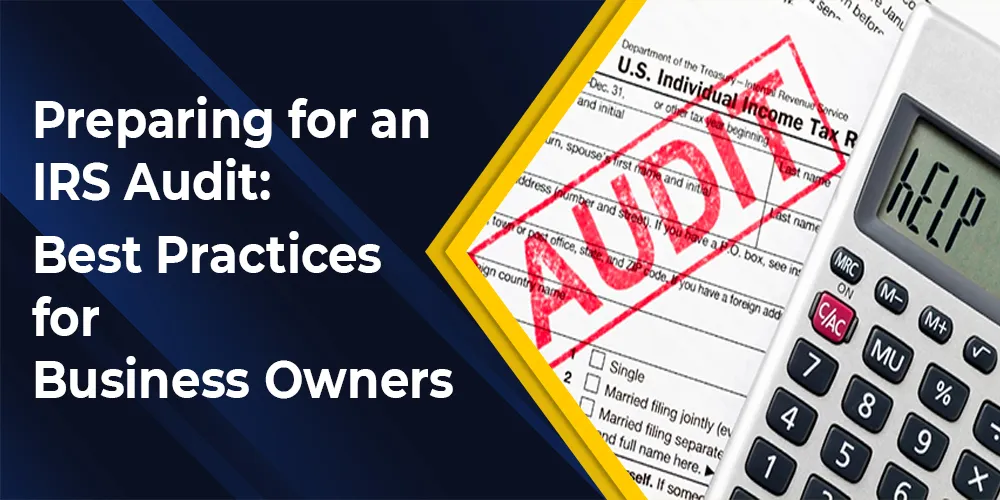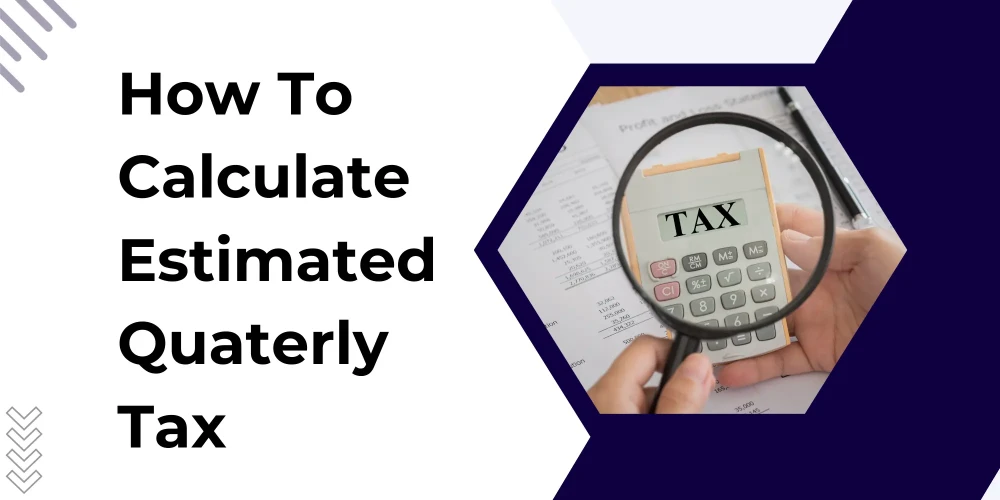Table of Contents
Facing an IRS audit can be a nerve-wracking experience for any business owner. The mere thought of having your financial records scrutinized by the Internal Revenue Service (IRS) can cause anxiety and uncertainty. However, it's crucial to understand that an audit is not necessarily an accusation of wrongdoing or a cause for panic. An IRS audit is simply a review of your tax returns and supporting documentation to ensure compliance with tax laws and regulations. While the process may seem daunting, proper preparation and a thorough understanding of the audit procedures can make it a manageable and even straightforward experience. To help you understand an IRS better, this blog demystifies the IRS audit process and provides you with the knowledge and best practices you need to navigate it successfully.
Why Do IRS Audits Happen?
The IRS selects businesses for audits based on various factors. Understanding these factors can help you recognize potential red flags and take proactive measures to avoid unwanted scrutiny.
- Random Selection: The IRS employs a random selection process to audit a certain percentage of tax returns each year. This process helps ensure compliance and fairness across all taxpayers, and no business is exempt from the possibility of being randomly selected.
- Inconsistencies in Tax Returns: If your tax returns show significant deviations from industry benchmarks or your own historical data, the IRS may flag your return for further review. Unexplained fluctuations in income, expenses, or deductions can raise suspicions and trigger an audit.
- Business Ties to Other Audited Entities: If your business has connections or transactions with other individuals or entities that have been audited, you may be at a higher risk of being selected for an audit as well. The IRS may scrutinize related parties to ensure compliance across the board.
- Disproportionate Deductions or Losses: Claiming excessive deductions or reporting substantial losses over multiple years can catch the IRS's attention. While deductions and losses are legitimate in many cases, they may be subject to closer examination if they seem disproportionate to your business's size or industry norms.
- High-Risk Industries: Certain industries are considered high-risk for tax compliance issues, such as cash-intensive businesses or those with complex tax structures. Businesses operating in these industries may face increased scrutiny from the IRS.
- Referrals or Whistleblower Tips: The IRS may initiate an audit based on referrals from other government agencies or whistleblower tips alleging tax violations or non-compliance. These external sources can prompt further investigation.
It's important to remember that an IRS audit doesn't necessarily indicate wrongdoing. In many cases, it's simply an opportunity to clarify any discrepancies or provide additional documentation to support your tax filings.
Best Practices Before an IRS Audit
Proper preparation is key to navigating an IRS audit successfully. By following these best practices, you can minimize stress and ensure a smooth process.
Accurate Recordkeeping is the Key
- Adopt Robust Recordkeeping System: Maintain a comprehensive and organized system for tracking income, expenses, and business assets. This includes keeping accurate accounting and bookkeeping records of invoices, receipts, bank statements, and other financial documents.
- Utilize Digital Storage Solutions: Consider utilizing cloud-based or digital storage solutions to keep your records easily accessible and organized. This can greatly simplify the process of retrieving and providing documentation during an audit.
- Prepare the Required Documents: Understand the specific documentation requirements for your business structure (sole proprietorship, partnership, LLC, corporation, etc.). This can vary depending on factors such as the type of business, number of employees, and revenue sources.
Know Your Deductions
- Understand Allowable Business Deductions: Familiarize yourself with the deductions that are permissible for your business. Keep in mind that deductions must be ordinary and necessary for your trade or business.
- Ensure Proper Documentation: Maintain thorough documentation for all deductions claimed, including receipts, invoices, and other supporting evidence. This documentation will be crucial in substantiating your deductions during an audit.
- Seek Professional Advice: For complex deductions or situations, it's advisable to consult a tax professional or Enrolled Agent. They can provide guidance on what qualifies as a legitimate deduction and ensure you're compliant with IRS regulations.
Be Prepared for Different IRS Audit Types
The IRS conducts audits in various formats, each with its own level of complexity and documentation requirements. The key audit types include:
- Correspondence Audits: These audits involve minimal documentation requests and are typically conducted through mail correspondence.
- Office Audits: In an office audit, you'll be required to meet with an IRS agent at their office and provide specific documentation related to your tax return.
- Field Audits: Field audits are the most comprehensive type of audit. An IRS agent will visit your business premises to examine your records and operations in-depth.
Understanding these types of audits can help you prepare accordingly and ensure you have the necessary documentation readily available.
What to Do When You Receive an IRS Audit Notice
Receiving an IRS audit notice can be overwhelming, but it's crucial to remain calm and respond appropriately. The key steps include:
- Review the Notice Carefully: Carefully read the audit notice to understand the type of audit, the requested documentation, and the timeframe for providing the information.
- Seek Professional Assistance: Consider contacting a qualified tax professional or Enrolled Agent for guidance. They can help you navigate the audit process, ensure you provide the correct documentation, and represent you during the audit if necessary.
- Respond Promptly: It's important to respond to the IRS within the given timeframe. Failing to do so can result in additional penalties and complications.
- Gather Relevant Documentation: Start compiling the requested documents and records as soon as possible. Organize them in a clear and logical manner to facilitate easy retrieval and presentation during the audit.
- Maintain Open Communication: Establish open lines of communication with the IRS agent assigned to your case. Respond to any additional requests for information promptly and cooperatively.
- Understand Your Rights: Familiarize yourself with your rights as a taxpayer during an IRS audit. This includes the right to representation, the right to appeal decisions, and the right to courteous treatment from IRS agents.
- Remain Calm and Professional: While an audit can be stressful, it's important to maintain a calm and professional demeanor throughout the process. Avoid confrontational or defensive behavior, as it may escalate the situation unnecessarily.
By following these steps, you can ensure that you're well-prepared and able to navigate the IRS audit process effectively. Remember, responding promptly, cooperating fully, and seeking professional assistance when needed can go a long way in minimizing potential issues and reaching a fair resolution.
Preparing for the IRS Audit with Your Tax Professional
Working with a tax professional or Enrolled Agent can be helpful during an IRS audit. These experts have a deep understanding of tax laws and the audit process, ensuring you're well-represented and protected. The key benefits of working with professionals include:
- Expertise in Navigating the Audit Process: Tax professionals and Enrolled Agents have extensive experience in dealing with IRS audits. They can help you understand the process, identify potential issues, and develop strategies to address them effectively.
- Communication with the IRS: Your tax professional or Enrolled Agent can communicate with the IRS on your behalf, ensuring that all requests for information are handled properly and that your rights are protected throughout the process.
- Representation During the Audit: If necessary, your tax professional or Enrolled Agent can represent you during the audit itself. They can attend meetings, provide supporting documentation, and advocate on your behalf to ensure a fair and accurate assessment.
- Impartial Third-Party Review: Tax professionals can provide an impartial third-party review of your financial records and tax returns. This objective assessment can help identify potential weaknesses or areas of concern that may require additional attention or documentation.
- Tax Law Expertise: CPAs and Enrolled Agents have in-depth knowledge of complex tax laws and regulations. They can help you navigate intricate tax situations, interpret tax codes, and ensure compliance with the latest guidelines.
- Negotiation Skills: Experienced tax professionals are skilled negotiators. If any issues arise during the audit, they can negotiate with the IRS on your behalf, potentially minimizing penalties or reaching a favorable resolution.
- Peace of Mind: Having a knowledgeable tax professional by your side can provide invaluable peace of mind during the audit process. You can rest assured that your interests are being protected, and you have an expert advocating for you every step of the way.
By working closely with a tax professional or Enrolled Agent, you can approach an IRS audit with confidence, knowing that you have the guidance and representation you need to navigate the process successfully.
Conclusion
Preparing for an IRS audit can seem daunting, but with the right mindset and proactive approach, it can be a manageable process. By maintaining thorough records, understanding allowable deductions, and being prepared for different audit types, you can minimize stress and ensure a smooth experience.Additionally, seeking guidance from a qualified tax professional or an Enrolled Agent like NSKT can provide invaluable support and expertise throughout the audit process. Their knowledge and experience can help you navigate the complexities of an IRS audit with confidence.
At NSKT, our team of experienced tax professionals and Enrolled Agents are dedicated to helping businesses navigate the complexities of tax compliance and IRS audits. With our expertise and personalized approach, we can provide you with the support and guidance you need to ensure a smooth and stress-free audit process. Our services include comprehensive tax planning and preparation, IRS audit representation, and ongoing tax advisory services tailored to your business's unique needs. We take pride in our commitment to staying up-to-date with the latest tax laws and regulations, ensuring that our clients receive accurate and reliable advice.







